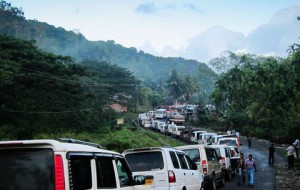
Survival received no response to the letter or subsequent appeals, even after launching a “boycott of the Andaman Trunk Road:/news/7396 with local organization Search.
Although it is illegal for outsiders to enter the Jarawa reserve, poachers are camping for days at a time in the tribe’s forest, hunting the animals they depend on and bringing disease, violence and exploitation.
Adding to the tribe’s problems, the islands’ main highway (known as the Andaman Trunk Road) cuts through their forest, bringing poachers, settlers and tourists. In 2002, India”s supreme court ordered that the road should be closed, but the local authorities have refused to comply.
In July 2011, Survival wrote again as a matter of “great urgency”, in response to “severe international concern about the Jarawa’s predicament and the threat that tourists pose”, but still the problem continued.
Four months ago, a complaint was also lodged by social worker Arvind Rai Sharma, after he saw a tour company’s promotional video of Jarawa women and children being “humiliated in front of tourists”.

Speaking to Survival, he said, “I personally handed in the letter to the Andaman authorities, and met the Director of Tribal Welfare. But they still did not take my complaint seriously, even though it was such a sensitive matter”.
Survival’s Director Stephen Corry said today, “It’s extraordinary that the local government appears only now to realize the extent of these ‘human safaris’. Survival first wrote to the administration in 2010 to highlight the issue. If they’re serious about finally tackling this problem, they need to close the Andaman Trunk Road, ten years after the Supreme Court told them to. “It is the only real solution”.
The ancestors of the Jarawa and the other tribes of the Andaman Islands are thought to have been part of the first successful human migrations out of Africa. Several hundred thousand Indian settlers now live on the islands, vastly outnumbering the tribes.
How do they live?
The Jarawa hunt pig and monitor lizard, fish with bows and arrows, and gather seeds, berries and honey. They are nomadic, living in bands of 40-50 people. In 1998, some Jarawa started coming out of their forest to visit nearby towns and settlements for the first time.
For more information visit www.survivalinternational.org

